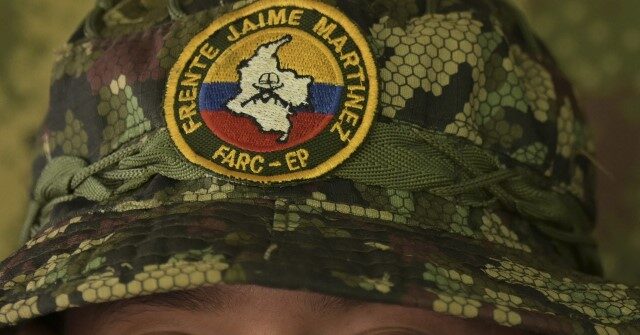Top News
Colombia’s FARC Terrorists Boast of Youth Recruitment Boom — 8 Years After ‘Peace Deal’

The Marxist Revolutionary Armed Forces of Colombia (FARC) terrorist organization announced this weekend the creation of a unit within the group to carry out criminal activities across four Colombian regions.
The FARC signed a “peace deal” in 2016 with the government of then-President Juan Manuel Santos and with the support of state sponsor of terrorism Cuba in which it claimed to abandon terrorism in exchange for uncontested seats in Congress, legal immunity, and other perks. Since then, mainstream media refers to the ongoing terrorist activities of the FARC as “dissident” actions, enforcing the fantasy that the only “true” FARC is the leadership welcome in Bogotá. The deal – as evidenced by the announcement this weekend of the expansion of terrorist operations – failed to eradicate the half-century-old narco-terrorist organization.
Santos won the Nobel Peace Prize in 2016 for the failed effort.
The announcement this weekend alarmed the Colombian conservative opposition after FARC leaders claimed that they were successfully recruiting “youth” to its new unit. The FARC has a long history of using child soldiers and engaging in crimes such as torture and rape of children.
The Colombian terrorist organization – whose “dissidents” are led by Néstor Gregorio Vera Fernández, also known as “Iván Mordisco” – made the announcement in a roughly five-minute video posted on social media. In the video, a man reportedly identified as Iván Jacobo Idrobo Arredondo, also known as “Marlon Vásquez,” announces that the new Central Bloc Isaías Pardo criminal unit will operate in the Colombian departments (the equivalent of states) Valle del Cauca, Huila, Tolima, and Quindío.
Anuncio: Conformación del Bloque Central Comandante Isaías Pardo de las FARC-EP. En solidaridad y respuesta a la agresión militar contra el Bloque Occidental Comandante Jacobo Arenas. Bienvenidos hombres y mujeres a fortalecer nuestras filas.
Ver video: 🎥 https://t.co/pGGFfRuZ0s pic.twitter.com/IVbKkKSfRM— Fuerzas Armadas Revolucionarias De Colombia (@FARCEP_) April 1, 2024
The far-left administration of socialist President Gustavo Petro — a former member of the Marxist M19 guerrilla — has conducted a series of negotiations with FARC and the Marxist National Liberation Army (ELN) as part of its “total peace” initiative.
As part of the negotiations, the Colombian military and FARC “dissidents” agreed to a ceasefire in October extended through July 15, 2024. Colombia suspended the ceasefire in March after FARC forces launched an attack on an indigenous community located in the country’s southwest, leaving one civilian dead and two injured.
Idrobo Arredondo claimed that the creation of the new criminal unit is a response to the suspension of the ceasefire.
“Today as yesterday, in the face of the announcement of an aggression against the FARC-EP [EP stands for People’s Army],” he said, “our dignified response of combat against injustice and for the new homeland is answered by men and women, blacks, peasants and indians ready to face politically and militarily the aggressions of the State against the people and its revolutionary army.”
Idrobo Arredondo is accompanied in the video by armed men and two girls presumed by local Colombian media to be minors.
“It has been fundamental for the creation of the commander Isaías Pardo bloc the linking of hundreds of young people to our ranks in these departments in these last two years,” Idrobo Arredondo said. “We hope to continue counting on young men and women willing to build a new homeland with the Farc-EP.”
Colombian opposition lawmakers heavily criticized Petro’s administration after the FARC made its announcement, denouncing Petro for allowing the organization to prosper.
Senator Miguel Uribe published a video on Monday accusing Petro of taking Colombia back to the “worst times of violence” and of allowing FARC to recruit minors.
“The FARC has just announced the creation of a new bloc and is calling on young Colombians to join its ranks. They confess that they have recruited dozens of young people during the government of Gustavo Petro,” Uribe said. “That is to say, while Petro offers them impunity, the Farc and the criminal organizations are getting stronger.”
Colombian lawmaker Hernán Cadavid detailed on Monday how the FARC has expanded its presence, increased its armed ranks, and expanded its criminal activities since Petro took office in 2022. Cadavid also stressed that, according to official statistics, there were at least 184 registered cases of forced recruitment of minors and 210 violations to the now-suspended ceasefire agreement by the FARC during 2023.
Otty Patiño, the Colombian high commissioner for peace, referred to the new FARC bloc as an “internal reorganization” and claimed the terrorists have “every right” to restructure.
Otty Patiño comisionado de Paz de Petro realizó llamativa declaración sobre el nuevo bloque que anunció las Farc de Iván Mordisco: “Es una reorganización interna de ellos, tienen todo el derecho de hacerla… hay que pensar bien a veces”. https://t.co/if1kX8q65f pic.twitter.com/GqxYgm3Ag8
— Revista Semana (@RevistaSemana) April 1, 2024
“I believe that the announcement is an internal reorganization that they have and if this internal reorganization leads them to respect the population, to respect the ceasefire, well, good, but it is an internal reorganization that they have every right to make,” Patiño said in remarks given on Monday to reporters.
He added:
I think they are forming blocs, I think they are grouping fronts, that is what I understand is happening. And if that contributes to having more responsibility on fronts – which, sometimes, everyone does what they want, without a central, more centralized responsibility – then this new reorganization of the blocs is welcome.
A reporter asked Patiño if the Colombian government sees the new FARC bloc as growth for the organization.
“No, no, on the contrary, I think … sometimes you have to think well that they are trying to reorganize in order to have more responsibility at the negotiating table,” he answered.
Christian K. Caruzo is a Venezuelan writer and documents life under socialism. You can follow him on Twitter here.
Read the full article here


















